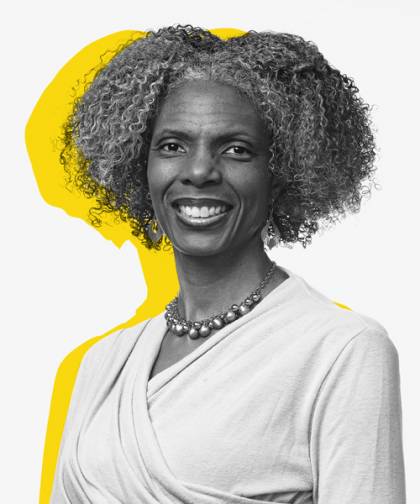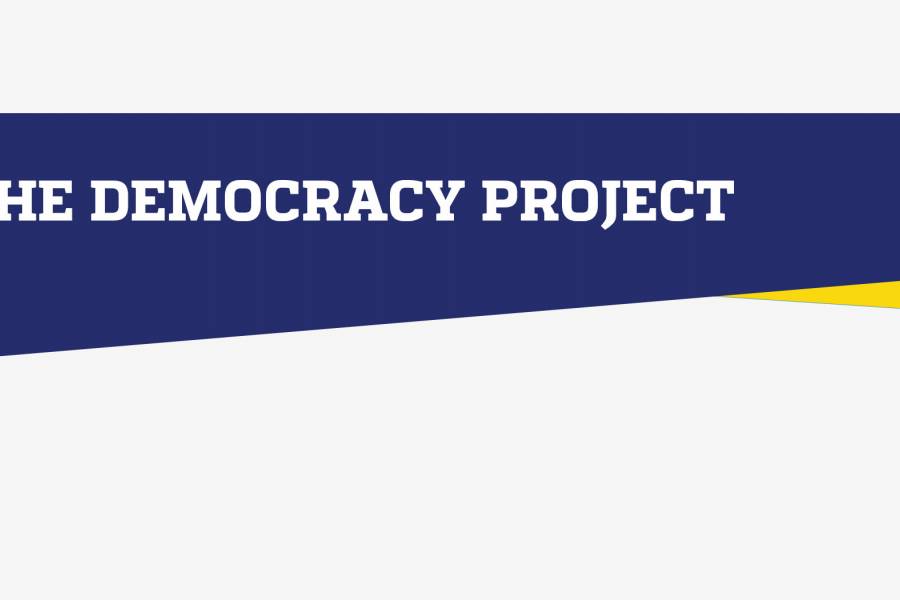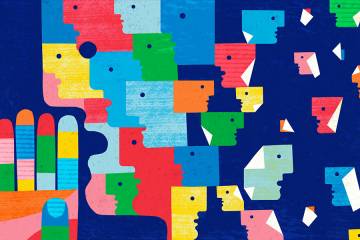
Image caption:Kamila Alexander is an assistant professor at the School of Nursing and the Bloomberg School of Public Health. Her research focuses on prevention of sexual health outcome disparities and the complex roles that structural determinants such as intimate partner violence, societal gender expectations, and limited economic opportunities play in the experience of intimate human relationships.
Image credit: Will Kirk / Johns Hopkins University
In early October, to celebrate our 6-year-old son's birthday, we took him and his 4-year-old brother to a dairy farm about an hour outside Baltimore. We ate ice cream, played in the nearby cornfields, and enjoyed the fresh air, temporarily escaping the isolation associated with the coronavirus pandemic. During our trip back to the city, we passed several racist political campaign signs disparaging Democratic vice presidential candidate Kamala Harris.
As my children excitedly counted the number of horses and cows they saw from the back seat, my husband and I looked at each other, both glanced at the gas meter to make sure we didn't need any, and nervously emphasized that we should not make any stops until we got closer to home. In that moment, as a Black family, we felt unsafe—in a state we have grown to love and cherish, especially given its historical significance for multiple generations of Black Americans.
Democracy is a system of government for the whole population. Freedom from violence—physical or psychological—is fundamental to that promise.
My research promotes healthy intimate relationships; between partners, psychological violence is one of the most pervasive and debilitating forms of abuse. In well-documented research, psychological violence often precedes physical violence, and its adverse effects can be just as harmful to health. Symptoms of depression, post-traumatic stress, and anxiety can wreak havoc on a person's physical health.
Black Americans have been subjected to dehumanizing forms of violence for centuries in the United States, and voter suppression, poll intimidation, and felony disenfranchisement are current realities limiting the voices of many Black Americans. The psychological toll of these tactics on individuals and the consequences for our democracy are yet to be measured or fully understood. Yet we press on in the fight to be legitimate citizens of our democracy.
We all deserve healthy bodies, minds, and souls. The unhealthy state of our current democracy is unjust, riddled with examples of physical and psychological violence that limit our abilities to raise healthy families and, in many cases, render our societal contributions invisible. For example, Black girls and women experience high rates of incarceration and racial profiling, as well as threats to our reproductive and sexual health. This severely alters our potential to reach economic prosperity, maintain physical health, and obtain an education that nurtures the mind. Yet, every election cycle, we canvass, we work at the polls, we lead campaigns, and we vote—because our lives depend on it.
My greatest hope for our democracy is that all people can attain a self-defined, optimal health status free of coercion, violence, bias, and discrimination. However, this vision requires deep examination of state-sanctioned psychological violence and its effect on our society—especially on our most marginalized citizens.
Democracy demands that we strengthen the networks, neighborhoods, and institutions that are available to all and are instrumental to a strong nation, one in which all Americans feel represented in power and control of their destiny.
As the enormous body of intimate partner violence research reveals, deep, often loving intimate relationships are sometimes permeated with tensions and conflicts. Black Americans' intimate relationship with the U.S. is often fraught, fractured by historical and contemporary injustices that cannot be ignored. Some solutions to intimate partner violence include prevention, interruption, and treatment. We can prevent IPV by shifting social norms for gender roles in families. We can interrupt IPV by using safety strategies. We can treat IPV with reframing techniques to present alternate options for resolving conflict. Yet in our current democracy, norms for civility are overshadowed by intimidation; witnesses to violence retreat in silence instead of interrupting; and we have limited options for conflict resolution.
I believe in the soul of this nation. We all desire that our nation's families and the future generations that come after us thrive. We must strengthen our democracy by treating each other with kindness and humanity—dismantling the legacies of psychological violence against Black Americans that constrains our nation's potential for greatness.
About The Democracy Project
The future of democracy as a system of government is increasingly uncertain. With a rise of populist forces globally and many existing democracies in regression, liberty itself seems under assault. In the United States, a diminished or warped democracy could have far-reaching repercussions for voting rights, the rule of law, education, the application of science, immigration, citizenship, and long-held societal norms we take for granted.
Following an election in which many of the defining principles of democracy seemed to hang in the balance, an array of Johns Hopkins experts will share their greatest hopes, their deepest fears, and their informed insights on the state of America's democratic experiment. Read more from The Democracy Project
Posted in Voices+Opinion, Politics+Society









